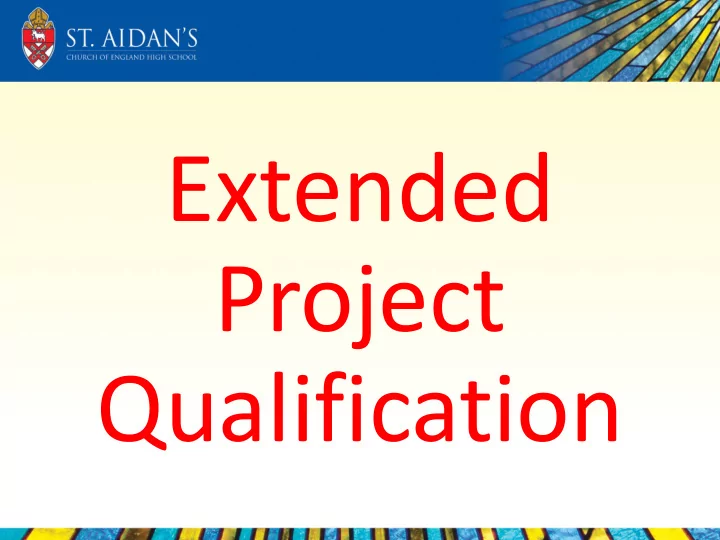

Extended Project Qualification
Introduction • What is an Extended Project? • What does an Extended Project involve? • What value does the Extended Project have? • How does the Extended Project operate at St Aidan’s? • What sort of questions have been completed in the past? • What happens next?
What is an Extended Project?
What is an Extended Project? • An Extended Project will develop and extend from one or more of the learner's study areas and/or from an area of personal interest or activity outside their main programme of study. No work that is submitted for the EPQ should be submitted for any other accredited qualifications. • It will be based on a topic chosen by the learner(s) and agreed as appropriate by the centre. • Most students write a 5,000 word essay, though they can produce almost anything they want as long as it entails research (eg some computer software, a fashion collection, a play, something which has been made).
What is an Extended Project? • Delivery of the EP will involve some teaching of the necessary skills, supervision and assessment of the learner's progress. • It will involve extended autonomous work by the learner and require a total of 120 guided learning hours. • Students will be assigned a supervisor who will monitor the progress of the student through their EP.
What does an Extended Project involve?
What does an Extended Project involve? Learners are required, with appropriate supervision, to: • choose an area of interest • draft a title and aims of the project for formal approval by the centre • plan, research and carry out the project • deliver a presentation to a specified audience • provide evidence of all stages of project development and production for assessment
What does an Extended Project involve? • Initiative • Commitment • Organisation • Discipline • Enthusiasm • Determination
What is the value of an Extended Project?
What is the value of an Extended Project? • There is limited evidence that EPQ's may make a difference to university offers. • It does however offer evidence of skills especially academic independent research so can be very useful to have as an addition to A Levels. • An Extended Project looks impressive on a personal statement and can be a useful discussion point in interviews.
University of Sheffield ‘We encourage students to complete an EPQ, where possible, as we value the development of skills in independent study and research, which an EPQ can offer... An EPQ in the subject that is related to the course or discipline that you wish to progress into may be taken into account by admissions tutors when making decisions between applicants of equal academic standing.’
University of Cambridge ‘We welcome the introduction of the Extended Project and would encourage you to undertake one as it will help you develop independent study and research skills and ease the transition from school/college to higher education .’
The Extended Project process at St Aidan’s February/March – introductory study skills sessions will be taught Wednesday Period 4 in the weeks students don’t have EEP. May/June – a day during study leave for students when they will be taught about different aspects of an EPQ eg Log book, Structure, Marking, Presentations. June – students identify project titles. June – September – students undertake independent research. September - students will be assigned a supervisor whom they will meet on a weekly basis. September – February – students will complete their EPQ. February – Easter – students will present the findings of their EPQ.
The Extended Project process at St Aidan’s • Students will apply to undertake an EPQ. • In considering the suitability of candidates staff will look at: – Projected grades in relation to target grades – Effort grades – Whether any concern has been expressed regarding student performance • Students must complete EPQ training in May/June.
What sort of questions have been completed in the past?
Past Extended Project titles ‘ The closing of the Tethys Sea towards the end of the Eocene epoch was the main factor in 1. causing the glaciation of Antarctica.’ Discuss. 2. The Design and Manufacture of a Prototype Gown Inspired by Marie Antoinette. 3. Do Parkinson's disease patients have a preference over administration of medication? 4. How do The Times and The Saturday Review portray the first woman MP, Lady Astor, 1919- 20, and how does the portrayal differ? 5. The Wet Summer Weather of 2012 in the United Kingdom: how unusual was the weather, why was there so much rainfall, and will future summers be similar? 6. A World War II Prisoner of War Camp in a rural British market town; was there an impact on the town and is there a legacy 65 years on? 7. Assess the need for and ethics of developments in joint implants. 8. To what extent has the discovery of DNA enhanced medicine? 9. How far has Keynes' theory affected economic thinking? 10. Assess the impact of stress on the immune system
What happens next? • Start thinking of some ideas • Write down a list of things you’re interested in • Try turning some of them into questions • Go to the AQA website and find the Extended Project section • Check your school email regularly for further information
Recommend
More recommend